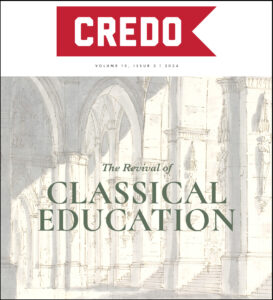Recently, I had the privilege of teaching Church History I for the first time to a group of students from around the world. I teach at an international seminary in the United Arab Emirates, whose student body represents a profoundly diverse demographic, from Arab to African, from South Asian to Eastern European. I was therefore challenged to make this class as representative as possible, in order to say to my fellow Christian students from around the world, “This story is our story—all of our diverse Christian traditions originate in some way here, in the first millennium of Christian History,” which, as you might imagine, was incredibly gratifying and doxological.
The scope of this class stretched from the period of the apostolic fathers in the second century to the Great Schism in the middle of the eleventh. Obviously, this being a survey course, we had to content ourselves with obscenely broad sweeps, which required a great deal of discipline on my part. Every era, every figure, every event tantalized me with tempting rabbit trails, and my internal dialogue was like a broken record: we’re being too reductionistic! There’s so much more to the story here! Still, we have to begin somewhere, and I think I can speak for my students when I say that our time spent whizzing through Christianity’s first thousand years was a surprising gift.
I was struck by many new discoveries throughout the class, but the one I wish to reflect on presently is the importance of literacy and the priority of learning for times of reformation and growth in the Church’s history. Literary and educational renaissances are a crucial part of our Christian story (and, indeed, the story of civilization). It should go without saying that any real leap forward in the Christian Tradition is always owing to the Holy Spirit’s work to revive and renovate the body of Christ, but he is pleased to use means to do this. This fact introduces something of a chicken and egg dilemma: is the literary output we find in these periods the fruit of the Spirit’s work of revival, or is it the means the Spirit is pleased to use to bring about revival? Probably, the answer is a complex “yes,” but regardless, it seems clear that God has been pleased to write the ebbing and flowing story of Christian history with ebbs that feature a dearth of learning and literature and flows that enjoy a surplus.
Institution-Building
Usually, this kind of reflection brings to our minds examples of individual authors and their great works. We think of the “golden age” of patristic works stretching from the fourth to the fifth century, which feature the likes of Athanasius (293-373), Hilary of Poitiers (310-367), the Cappadocians (chiefly Gregory of Nazianzus [330-389], Gregory of Nyssa [335-394], and Basil of Caesarea [330-378]), John Chrysostom (337-407), Ambrose (339-397), Jerome (342-420), Augustine of Hippo (354-430), and the like. We think of the creative execution of Boethius (480-524), the theological genius of Maximus the Confessor (580-662), or the boldness and clarity of John of Damascus (675-749). And for good reason. Surely, the Christian literary tradition wouldn’t exist without these figures.
But what I have in mind here is not so much the genius of individual thinkers but rather the remarkable institution-building that seems to typically coincide with a renaissance of learning and literary output that outlives these great authors, their eras, and even the institutions that platformed them. I’m thinking, for example, of the lasting legacy of Antioch and Alexandria, and their respective schools; or those formidable schools East of Byzantium in Edessa and Nisibis, which became the spring-source of Syrian Christianity for the next thousand years; or the flourishing of Byzantine culture and theology witnessed under the renaissance-minded sixth-century giant, Justinian the Great (483-565).
Consider the fact that while Charlemagne’s (748-814) political legacy may have been a letdown after his death—when his Holy Roman Empire devolved into feudal states almost immediately—his cultural legacy is unmatched on account of Aachan, that center of learning and culture and literature. With the help of Alcuin of York (732-804), one of the greatest minds of the eighth century, Charlemagne engaged in a full-scale cultural renewal project, which centered around concentrated efforts to translate important works from the past.[1] A century later, King Alfred the Great (848-899)—inspired by Charlemagne—would do the same for a dilapidated England.[2] In fact, many of the great minds we celebrate today were handed down from generation to generation, sometimes very self-consciously in the midst of institutionally-sponsored cultural renewal projects. Consider this excerpt from Alfred, taken from his preface to the then-newly translated Book of Pastoral Rule by Pope Gregory the Great (540-604):
Here [in the great works of the preceding Christian Tradition, which were not then available in the common tongue] men may yet see their path, but we know not how to tread in their footsteps, inasmuch as we have both lost that wealth and wisdom, for that we would not with our minds stoop to their tracks.
When I then called to mind all this, I then wondered greatly about those good and wise men that had been of old among the English race, and who had fully learned all the books that they have not been willing to turn any part of them into their own language. But then I soon again answered myself and said, “They did not think that men would ever become so reckless and that learning should fall off in such a way. Of set purpose, then, they let it alone, and wished that there should be more wisdom in this land; the more languages we knew.” Then I remembered how the law was first found in the Hebrew tongue, and again when the Greeks learnt it, then they turned the whole of it into their own language, and also all the other books. And again the Latins also in the same way, when they had learned it, turned it all through wise interpreters into their own language, and likewise, all other Christian nations have translated some part into their own speech.
Wherefore I think it better, if it also appears so to you, that we, too, should translate some books which are the most necessary for most men to understand that we should turn these into that tongue which we all can know; and so bring it about, as we very easily may, with God’s help, if we have rest, that all the youth that now is among the English race, of free men that have property, so that they can apply themselves to these things, may be committed to others for the sake of instruction, so long as they have no power for any other employments, until the time that they may know well how to read English writing.[3]
Alfred considered it a great tragedy that his English predecessors—men like Alcuin of York or the Venerable Bede (672-735)—failed to write or translate great works into the tongue of their own people. But before allowing himself to chastise them for their “neglect,” he acknowledges that they would have never imagined that the English people would sink so low in their educational slothfulness that they would allow for Latin and Greek to fall out of use. So, rather than belly-aching about the abysmal state of affairs in his day, Alfred decided to launch out on an intentional, calculated effort to revive the wisdom of old by translating the great works of previous generations into the ordinary language. His efforts were clearly not for nothing since, just a few generations later, England went from inspiring lamentation from Alfred over its lack of learned thinkers to producing the likes of Anselm (1033-1109).
And in these stories, these literary and educational renaissances compounded on one another: Alfred was inspired by Charlemagne, who is inspired by Justinian, who was inspired by Constantine (272-337). Alcuin was inspired by Bede, who was inspired by Gregory the Great, who was inspired by Augustine. This is why many of these renaissances featured the same literary works alongside fresh ones produced, even when they were separated by generations. The Book of Pastoral Rule played a crucial part in many a revival in the Western Tradition, as did Boethius’s The Consolation of Philosophy, Augustine’s works, and many others. Educational reform, translation work, and fresh works of theology and philosophy: these episodes mark great peaks in the mountainscape of Christian Tradition. Educational reform, translation work, and fresh works of theology and philosophy: these episodes mark great peaks in the mountainscape of Christian Tradition. Share on X
Of Monks and Mustard Seeds
Sometimes, these threads are direct and clear: the educational reform and translation programs institutionalized by Charlemagne and Alfred led to an immediately discernible impact on the Church and the wider culture. But sometimes, the impact of learning and literature is more indirect, though no less consequential. For example, it is well known that the trivium and quadrivium championed by Boethius at the close of the fifth century, and refined by Isidore of Seville (560-636) at the close of the sixth century, would go on to shape Medieval education at large profoundly. But how Boethius gets his influential thoughts from fifth-century Rome to Medieval Europe is the story of educational reform, translation, and a commitment to preserving the wisdom of the past. The steady educational project of translation and copywork is too seldom appreciated when we tell the story of intellectual history. Boethius can do wonders for revival and renewal, but only if he is read and understood.
Thomas Cahill has told the rousing and unlikely story of the Irish contribution to civilization along these lines in his appropriately titled, How the Irish Saved Civilization.[4] No one would have imagined in the fourth century that the Celts dwelling in Ireland would become one of the most important links in the chain of literary transmission in the Christian Tradition, thanks to the Irish converts-turned-monks in that tiny island of “barbarians,” but that is precisely what happened. In fact, those “white martyr” monks had a direct role to play in the Carolingian and Northumbrian renaissances already mentioned since the scribal practices of those respective renewal practices can be traced from Egyptian and Syrian habits, preserved by the Irish and imported to Northern England and Europe through the efforts of men like Columcille (521-597) and Aiden (d. 651).
This reminder of Irish determination reminds us of another Irish-born intellectual giant, C.S. Lewis. In 1939, right at the start of England’s involvement in World War II, Lewis preached a sermon to the students at Oxford University entitled, “Learning in Wartime.” In that sermon, he reminds his young listeners of the enduring worth of their studies. “Plausible reasons have never been lacking,” he said, “for putting off all merely cultural activities until some imminent danger has been averted or some crying injustice put right. But humanity long ago chose to neglect those plausible reasons.”[5] Lewis was as fitting a figure to remind those students of such a lesson as any since his own university studies were temporarily put on hold during the last Great War when he was drafted to fight for his country. The lesson Lewis hoped to deliver to his students is evergreen: “The only people who achieve much [in their studies] are those who want knowledge so badly that they seek it while the conditions are still unfavorable. Favorable conditions never come.”[6]
Lewis himself has played a similar role as the Irish scribes of the Middle Ages or the translators and copyists of the Carolingian dynasty and the literary renaissance under the direction of Alfred the Great. Like these figures, Lewis was a distributor of great ideas from the past. He was an incandescent figure, taking in all the luminous brilliance of the wisdom of the ages into his own person, and radiating it all outward for those of his own generation. And, as he was at pains to remind his young audience in that 1939 sermon, this kind of work has no shortcuts. The call to read and learn and copy and translate and write and converse with the past is never complete on this side of glory. The interruption of war must not interrupt this vocation; but it certainly can and should galvanize such a vocation and place it in its proper context:
If we thought we were building up a heaven on earth, if we looked for something that would turn the present world from a place of pilgrimage into a permanent city satisfying the soul of man, we are disillusioned [by war], and not a moment too soon. But if we thought that for some souls, and at some times, the life of learning, humbly offered to God, was, in its own small way, one of the appointed approaches to the Divine reality and the Divine beauty which we hope to enjoy hereafter, we can think so still.[7]
Retrieval: More Than a Fad
Incidentally, all the preceding is why “theological retrieval” can never be reduced to a mere fad. It has always been a nonnegotiable ingredient to inspire Church renewal. Ressourcement always brings vitality—how can it not? The work of translating and re-presenting great works of the past very naturally eventuates in a flurry of new, fresh educational reform and explosions of literary output. In fact, this sort of thing is one of the few means we can be sure to use in order to make a positive contribution to Christian history. The only kind of contribution worth the designation is one that thrives within a living tradition. If theologians and authors and educators of one generation refuse to converse with a long tradition that precedes them, they can be certain their ideas will not outlast them. They are flashes in the pan—ingrown and myopic, and spoken ultimately into an empty atmosphere. If theologians and authors and educators of one generation refuse to converse with a long tradition that precedes them, they can be certain their ideas will not outlast them. Share on X
To be Christian is to be part of a lively and living tradition—we have arrived in the middle of a story already begun, and which is still being told. If we wish to have a worthwhile role to play in this story, we need to familiarize ourselves with what’s already happened and learn from the very best of previous generational wisdom. This is why I routinely charge my students to think about the literary resources available in their native tongue, and to pray that God would empower and enliven those who might give themselves not only to preaching the gospel in their heart language, but also to translate important historical works thereunto, while producing fresh works of their own. Who knows how God might answer such a prayer? Perhaps he might be pleased to use some of those prayers as answers to their own requests. Regardless, I think we can assume that when and where real revival breaks out, good books and a love of learning are never far.
Notes:
[1] See Derek Wilson, Charlemagne: A Biography (Doubleday, 2006), ch. 8.
[2] See Justin Pollard, Alfred the Great: The Man Who Made England (John Murray, 2006), ch. 12-18.
[3] Alfred the Great, “Preface” to Pope Gregory the Great, The Book of Pastoral Rule.
[4] Thomas Cahill, How the Irish Saved Civilization: The Untold Story of Ireland’s Heroic Role from the Fall of Rome to the Rise of Medieval Europe (Anchor Books, 1995). I should note here that Cahill’s portrayals are not always trustworthy, especially his depiction of Augustine of Hippo in contrast to St. Patrick. Still, the story he rehearses is very well told and compelling.
[5] C.S. Lewis, “Learning in Wartime,” in The Weight of Glory and other Addresses (HarperCollins, 2001), 50.
[6] Lewis, “Learning in Wartime,” 60.
[7] Lewis, “Learning in Wartime,” 63.
Photo Credit: frscspd



